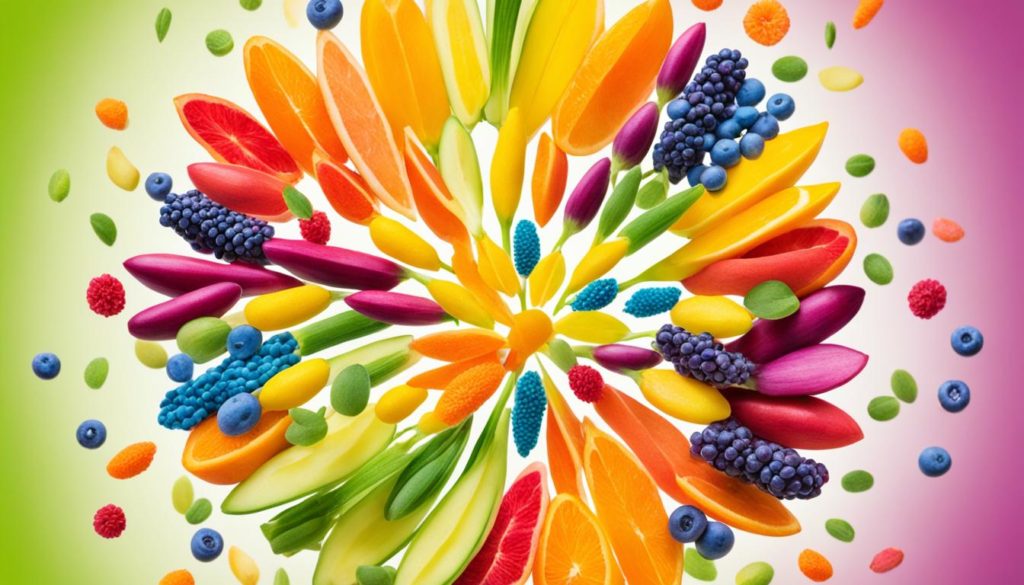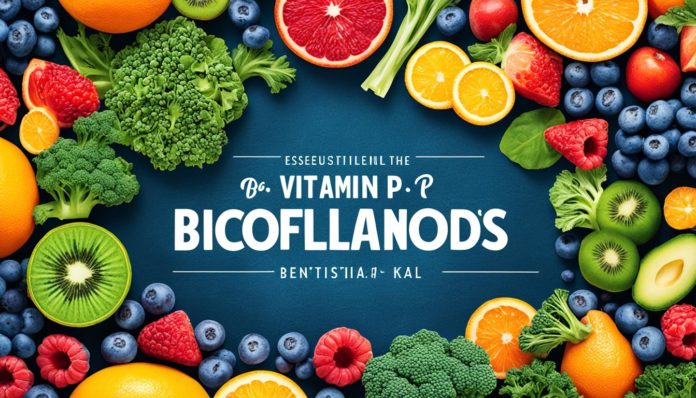Vitamin P, also known as bioflavonoids, is key for good health. These compounds are vital in many body processes. They offer great health benefits. In this article, we will learn about bioflavonoids’ importance in our diet. We’ll also see how they boost our well-being. Let’s find out why Vitamin P is crucial and how to include it in our daily meals.
Key Takeaways
- Vitamin P, or bioflavonoids, is crucial for various biological functions.
- Bioflavonoids provide extensive health benefits, enhancing overall wellness.
- Incorporating Vitamin P into your diet can boost your health significantly.
- The coming sections will delve deeper into different types of bioflavonoids.
- Understanding the role of bioflavonoids can guide healthier dietary choices.
Introduction to Vitamin P
Vitamin P is not as widely known but is crucial for nutritional health. We explore its history, discovery, and importance. It shows the unique role of vitamin P in the world of bioflavonoids.

In the early 20th century, experts found vitamin P. It is also called bioflavonoids. These compounds give fruits and veggies their bright colors.
But these substances do more than just look pretty. They have big health benefits for us. This highlights the value of bioflavonoids.
Vitamin P isn’t called a traditional vitamin today. Yet, its role is vital. Adding bioflavonoids to our diet supports our nutritional health.
This shows how vitamin P moved from just a plant color to an important health element. Understanding bioflavonoids helps us see their contributions to our health.
What are Bioflavonoids?
Ever wondered about bioflavonoids and their health benefits? Often called Vitamin P, they play a big role in keeping us healthy.
Definition and Classification
Bioflavonoids, also known as flavonoids, are strong nutrients found in plants. They make fruits and vegetables colorful – like purples, reds, and yellows. Flavones, flavonols, flavanones, isoflavones, anthocyanidins, and catechins are some of their types.

Health Benefits
The vitamin P health benefits are impressive. Bioflavonoids have antioxidant properties. They fight free radicals, keeping cells safe from damage. This lowers the risk of chronic diseases like heart disease and cancer.
Bioflavonoids also boost vascular health. They strengthen capillaries and help blood flow, preventing issues like varicose veins and hemorrhoids. Plus, they support heart health by lowering blood pressure and improving cholesterol levels.
Eating foods with bioflavonoids brings many benefits. From better skin to a stronger immune system, they’re key for a healthy diet.
The Role of Rutin in Health
Rutin is a strong bioflavonoid that keeps blood vessels healthy and supports heart function. It fights oxidative stress, which can harm cells and cause health problems. Knowing where to find rutin and how to add it to your diet can boost your health plan.
Sources of Rutin
You can find rutin in many fruits and vegetables. Foods like citrus fruits, apples, and berries are rich in rutin. Buckwheat and other veggies are also great sources. Eating these foods helps your blood vessels and improves your health.
Rutin Supplements
If your diet lacks rutin, supplements are an option. They come as capsules and tablets, giving a concentrated dose. Make sure to choose high-quality brands for the best benefits. Rutin supplements can boost blood flow, lessen bruising, and help with inflammation.
| Food | Rutin Content (mg/100g) |
|---|---|
| Buckwheat | 450 |
| Apples | 5 |
| Citrus Fruits | 19 |
| Berries | 12 |
Exploring Citrus Bioflavonoids
Citrus bioflavonoids are found in fruits like oranges, lemons, and grapefruits. They are crucial for our health. These compounds have antioxidant properties. They help reduce oxidative stress and inflammation.
The most common types of citrus bioflavonoids are hesperidin, quercetin, and rutin. Each one supports our health in different ways:
- Hesperidin: Improves how blood vessels function and lowers inflammation.
- Quercetin: Acts as a strong antioxidant, shielding cells from harm.
- Rutin: Aids in strengthening blood vessels.
Eating fruits rich in bioflavonoids boosts your health. They help with heart health, immune system, and skin health.
“Citrus bioflavonoids are key dietary compounds. They provide several health benefits, especially for heart and immune system health.”
To get these bioflavonoids in your diet, focus on these fruits and their specific benefits:
| Fruit | Primary Bioflavonoids | Health Benefits |
|---|---|---|
| Oranges | Hesperidin, Quercetin | Promotes cardiovascular health, reduces inflammation |
| Lemons | Hesperidin, Rutin | Enhances immune function, supports skin health |
| Grapefruits | Hesperidin, Quercetin | Improves blood vessel function, antioxidant protection |
In summary, eating fruits with citrus bioflavonoids can greatly improve your health. They are an essential part of a balanced diet.
Benefits of Plant Pigments
Pigments in plants do more than catch the eye; they boost our health. These bioflavonoids shield and enhance our well-being. By learning about the perks of plant pigments, we make smarter diet choices.
Natural Sources
Fruits, veggies, and herbs are great for getting bioflavonoids. Adding them to what you eat boosts your health.
- Berries: Blueberries, strawberries, and blackberries are full of bioflavonoids.
- Nuts: Almonds and walnuts are not just tasty; they’re also packed with these beneficial pigments.
- Herbs: Parsley, thyme, and cilantro have lots of plant pigments that are good for you.
- Citrus Fruits: Oranges, lemons, and grapefruits have lots of bioflavonoids.
Health Advantages
Eating plant pigments brings many health perks. These bioflavonoids lead to many good effects on health.
- Antioxidant properties: They fight oxidative stress, cutting down the risk of long-term diseases.
- Anti-inflammatory benefits: Regular eating can lessen inflammation and its discomforts.
- Improved cardiovascular health: They keep blood vessels healthy and lower heart disease risks.
- Enhanced immune function: Bioflavonoids strengthen the immune system, protecting against sicknesses.
Adding these bioflavonoid-rich sources to your diet greatly improves health. They don’t just help your body work better; they also boost your vitality and overall well-being.
Vitamin P and Anti-Inflammatory Effects
Vitamin P, also known as bioflavonoids, is key in reducing inflammation in our bodies. It works by changing cellular processes that help manage inflammation. By eating lots of fruits and vegetables, we get bioflavonoids. They help fight off free radicals and reduce oxidative stress, important in battling inflammation.
Bioflavonoids can also change how our immune system responds. This can help prevent chronic diseases. Studies show they stop enzymes that make inflammation worse. They also strengthen collagen and other tissues, showing how important they are in fighting inflammation.
If you want to learn more about Vitamin P and its benefits, check out this comprehensive guide. It gives deep insights into how bioflavonoids work. Adding foods rich in Vitamin P to your diet can really improve your health by using these powerful anti-inflammatory properties.
Understanding Quercetin
Quercetin is a key bioflavonoid known for its health perks. To make the most of these benefits, we need to find where it comes from in our diet. We’ll also look at the many advantages of eating foods with quercetin.
Dietary Sources
Quercetin is found in lots of fruits and veggies. Major sources are apples, onions, citrus fruits, and berries. Eating these foods often will improve your quercetin dietary intake.
- Apples: A top source of quercetin, especially in the peel.
- Onions: Red and yellow types have plenty.
- Citrus Fruits: Look for lemons, limes, and grapefruits.
- Berries: Lots of quercetin in blueberries and cranberries.
Health Benefits
Quercetin helps in many ways:
- Antiviral Properties: Studies show quercetin has strong antiviral powers.
- Anti-inflammatory Effects: Regularly eating quercetin-rich foods might lessen inflammation issues.
- Cardiovascular Health: It’s good for the heart, improving circulation and lowering heart disease risks.
- Antioxidant Activity: Quercetin works as an antioxidant, defending cells from damage.
In summary, quercetin’s many health advantages highlight the value of a quercetin-rich diet. By choosing such foods wisely, people can boost their health and wellbeing.
Hesperidin: A Potent Bioflavonoid
Hesperidin is a strong bioflavonoid mostly found in citrus fruits. It is celebrated for its health perks. It helps with blood flow and supports the heart.
This bioflavonoid goes beyond nutrition. Studies show it can help with chronic venous insufficiency and diabetes. It improves vascular function, lessens inflammation, and fights oxidative stress. For more info, see WebMD’s guide.
Researchers have looked into how the body absorbs and processes hesperidin. They have tested micronized forms, like Daflon 500 mg. These studies prove its importance for a healthy heart.
Hesperidin’s benefits, especially its protective effects on nerves and anti-inflammatory roles, are well known. These features make it a great part of any diet for good health. For further details, check out Health Care Navigator.
- Neuroprotective Effects: Helps protect brain cells from damage.
- Anti-inflammatory Properties: Reduces inflammation, contributing to overall health.
- Improved Circulation: Supports better vascular function.
| Type of Hesperidin | Benefits | Source |
|---|---|---|
| Regular Hesperidin | Improves blood circulation | Citrus Fruits |
| Micronized Hesperidin | Enhanced absorption and efficacy | Supplements (e.g., Daflon 500 mg) |
The Role of Vitamin P in Combating Inflammation
Vitamin P, known as bioflavonoids, is key in fighting body inflammation. These compounds are at the heart of many studies. They’re researched for their strong anti-inflammatory effects.
Anti-inflammatory Properties
Vitamin P helps reduce inflammation through several biological ways. Bioflavonoids can block the making of inflammation-causing substances. By doing so, they ease swelling, pain, and redness.
Scientific Studies
Many studies have proven Vitamin P’s role in fighting inflammation. Much research shows bioflavonoids’ anti-inflammatory powers. For instance, the Journal of Inflammation discussed quercetin. This bioflavonoid lowers inflammation markers in our bodies. These results highlight bioflavonoids’ potential in diets to control inflammation better.
How to Incorporate Vitamin P into Your Diet
Adding more vitamin P to your day is easier than you might think. Start with whole foods rich in bioflavonoids. This ensures you get a wide range of nutrients every day. Here are a few easy tips to begin:
- Include a Variety of Fruits and Vegetables: Citrus fruits, berries, and leafy greens are great for vitamin P. Try adding them to your meals and snacks.
- Opt for Whole Foods Over Processed: Whole foods have more vitamin P than processed foods. Choose fresh or frozen fruits and veggies first.
- Incorporate Legumes and Nuts: Legumes and nuts, like beans and almonds, are good sources too. Use them in salads, soups, and stir-fries for an extra nutrition kick.
- Consider Supplements: If getting enough vitamin P from food is hard, think about supplements. Talk to a health expert to pick the best one for you.
- Balance with Vitamin C: Vitamin C and P work better together. Oranges, strawberries, and kale are good for both nutrients.
Here’s a closer look at the best foods for vitamin P:
| Food | Rich in Vitamin P |
|---|---|
| Oranges | Yes |
| Strawberries | Yes |
| Kale | Yes |
| Beans | Yes |
| Almonds | Yes |
By making these changes, your diet will be full of vitamin P. This leads to better health. Remember, eating a variety of these foods regularly is key.
Conclusion
Vitamin P, known as bioflavonoids, is key for good health. We’ve looked at different types like rutin and quercetin. Each one has its special benefits.
These bioflavonoids are powerful for their antioxidant and potential to fight inflammation.
Eating foods rich in bioflavonoids, like citrus fruits and berries, boosts wellbeing. These foods help with things like inflammation and heart health. They also strengthen the immune system.
It’s smart to get advice from health experts about your diet. Making informed choices can lead to better health. Bioflavonoids play a big part in a healthy lifestyle.
FAQ
What is Vitamin P?
Vitamin P represents a group of bioflavonoids. These are plant pigments. They offer great health advantages. Examples include rutin, quercetin, and hesperidin.
What are the health benefits of bioflavonoids?
Bioflavonoids come with many health perks. They fight inflammation and act as antioxidants. Also, they help keep your blood vessels healthy.
Where can I find natural sources of bioflavonoids?
Many fruits and vegetables are rich in bioflavonoids. Look for them in citrus fruits, berries, onions, and greens. You can also find them in dietary supplements.
What is rutin and where can I find it?
Rutin supports healthy blood vessels. Find it in buckwheat, apples, and citrus fruits. You can also get rutin from supplements.
What are citrus bioflavonoids?
Citrus bioflavonoids come from oranges, lemons, and grapefruits. They’re prized for their antioxidant ability. They also boost the immune system.
How do plant pigments benefit health?
Plant pigments, like bioflavonoids, offer big health benefits. They reduce inflammation and fight oxidative stress. Plus, they’re good for your heart.
What is quercetin and what are its benefits?
Quercetin is a bioflavonoid with potential against viruses. It’s in apples, onions, and tea. Quercetin helps the immune system and fights inflammation.
What is hesperidin and what are its health effects?
Hesperidin is a strong bioflavonoid found mostly in citrus fruits. It boosts blood circulation. And it protects the heart.
How do bioflavonoids help with inflammation?
Bioflavonoids target cellular processes linked to inflammation. They are explored for preventing chronic diseases.
How can I incorporate more Vitamin P into my diet?
Add more fruits and veggies to your meals, especially those rich in bioflavonoids. Citrus fruits, berries, and greens are good choices. Supplements offer extra support, too.


